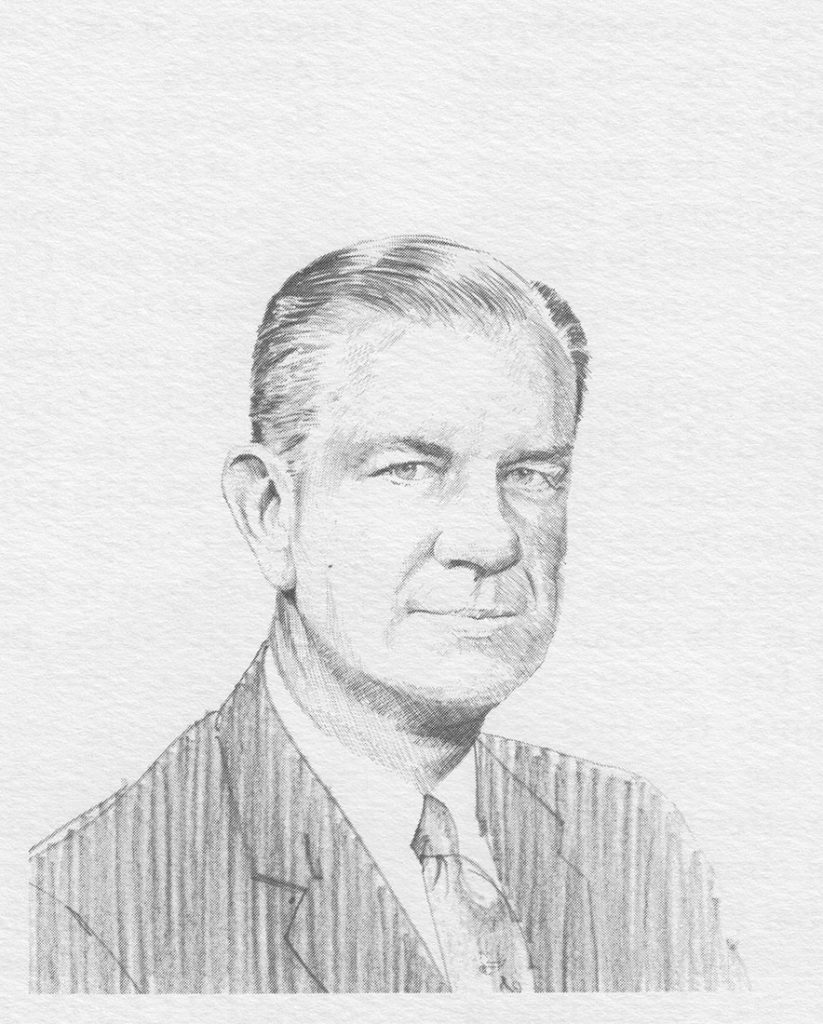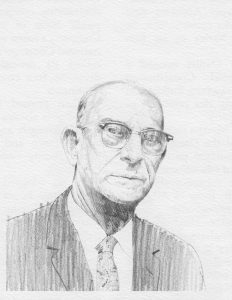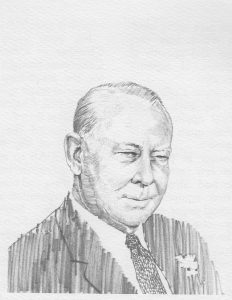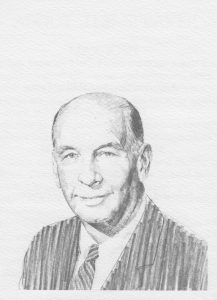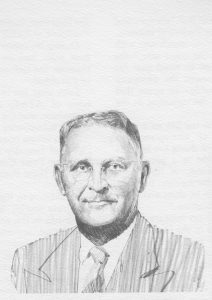This realistic philosophy, combined with the humanistic belief that people and their needs should be uppermost in decision making, led him through four companies and 17 positions in the Bell System to the chair he occupied from 1967-1970 as the first Southern president of AT&T.
Ben Screws Gilmer was born March 5, 1905, in Savannah, Georgia, son of Meriwether Nicholas and Josephine (Screws) Gilmer. His parents, each descended from a long line of native Alabamians, returned to their hometown Montgomery when he was six months old.
Ben Gilmer grew up near the State Capitol. As a boy, he often played on the western slope of the Capitol grounds and sat in the gallery after school watching the deliberations of the legislatures in which his grandfather Ben Screws (former captain in the Confederate Army) had served as State Senator.
The young man was educated at what a Montgomery reporter called “the famed schools” of Sayre and Lawrence streets and Sidney Lanier High School, from which he graduated in 1922. Having exhibited a natural facility for precision, order, and mathematics during high school, he chose engineering as his calling. He enrolled in the electrical engineering course at Auburn University and graduated with a B.S. degree in 1926.
Ben Gilmer’s long career with the Bell System began in June 1926. He worked in Birmingham as an in staller for the Southern Bell Company or a month before the time when he and 41 other recently recruited college graduates were to report in Atlanta for the Company’s six-month training course.
His first day was not exactly auspicious he remembers that he ran out of gas on the way to work. Some have said that this may have been his last faux pas. From then on, his commitment to be “the best telephone man in the world” was evident in the steadily increasing responsibilities delegated to him.
Although a graduate electrical engineer, he never got involved in watts, volts, and decibels in the telephone business. He wound up in marketing and development activities which led to cost and rates with a natural transition into regulatory matters. After completion of the introductory training course, the young man progressed through a series of positions in the Commercial Department of Southern Bell in Atlanta.
During the early and middle 1930s (when depression had created a de mand for rate reduction) and up until the U.S.’s entry in World War II, he appeared frequently as a witness before regulatory commissions in the nine states comprising the Southern Bell Territory and acquired the mantle of Expert Technical Witness. Although he found it “fun” to match wits with witnesses and lawyers “on the other side,” the young executive always kept in mind that his main purpose was to represent the company policies and position favorably-to stress that the basic aim was to serve the customer most economically.
As he later said, “Business teaches us a stern lesson: The consequence of attempting too much, as the consequence of doing too little, is a failure. Finding what is right is a process of matching needs with resources, of rigorously assigning priorities that distinguish between what must be done, what can be done, and what had best be scheduled for tomorrow.”
In 1942, Ben Gilmer went on military leave. After serving for three years in the U. S. Army Air Force and attaining the rank of lieutenant colonel, he returned to Southern Bell as an executive in the Atlanta office. Once more he was called upon to testify before regulatory commissions, this time in an economy faced with the decline in purchasing power of the dollar.
By 1948, he had been named Assistant Vice President. When the Louisiana manager of the company became ill that year, Ben Gilmer was sent, on 24 hours notice, to take over the position. He was responsible for all public aspects of the job, including customer accounts, customer relations, public relations, regulatory and legislative affairs, market studies, and growth forecasts for the construction of expanded facilities and capacities. In less than a year, he was back in Atlanta as General Commercial Manager, assuming responsibility for the management of these activities in the nine states serviced by Southern Bell.
In two years, he went to Northwestern Bell Company as Vice President and General Manager with responsibility for all company operations. In only one year, he was named Vice President of the California operations of the Pacific Telephone & Telegraph Company, where he served three and one-half years before re turning to Atlanta as Southern Bells’ Vice President and Chief Operating Officer. He served in this position for about a year before being named President of Southern Bell, where he served for 8½ years. In 1965 he went to New York as Vice President and Chief Operating Officer of AT&T. During his tenure as vice president, he made his last appearance before a regulatory commission about the need for objectivity in controlling competition in communications so that the public would receive optimal service for the least cost.
In 1967, Ben Gilmer was appointed President of AT&T. During his career, Ben Gilmer was known as a man who had an uncanny knack for pulling together the technical and non-technical aspects of a problem.
Even after his retirement, he remained a director of AT&T, a member of its executive committee, and the director of several of its corporate subsidiaries. Among the other corporations on whose board he has served are the U.S. Pipe and Foundry Corporation, Manufacturers Hanover Trust Company, Merck & Co., and the West Point Pepperell Manufacturing Corporation.
In addition to his demonstrated ability in the corporate world, Ben Gilmer has contributed leadership in the economic, civic, cultural, and educational activities of his community and region. He has served as either director, chairman of the board, or trustee of more than thirty civic and charitable organizations, such as the Atlanta Chamber of Commerce, the Atlanta United Ap peal, and the National Executive Council of the Boy Scouts of America. He has been chairman of the Auburn University Foundation, a trustee of Agnes Scott College, an elder in the Presbyterian Church, and a member of various professional engineering and business honoraries.
Despite the long absences demanded by his career, Ben Gilmer has maintained close ties with the State of Alabama, as the Governor and the legislature recognized when they invited him to address a joint session in 1967. Nine years before, Auburn University demonstrated its respect for his achievements by awarding him an honorary Doctor of Science degree. In 1969, the Alabama Conference of Christians and Jews recognized his “outstanding contribution to improving human relations” by giving him its National Brotherhood Award for promoting equal opportunities in the industry. In 1975, he was inducted into the Alabama Academy of Honor by the State Legislature. Similar recognition of his achievements and contributions has also come in Georgia and the nation.
Since 1939, Ben Gilmer has been married to the former Dorothy Cunningham of Decatur, Georgia. They now reside in Atlanta where their daughter, Mrs. Penn W. Rooker, and their two grandsons-Penn W. Rooker, Jr., and Ben Gilmer Rooker – also live.
Realism, humanism … “The Gilmer Blend” continues to be apparent in the life of Ben Screws Gilmer, the man whom both Alabama and Georgia claim as a “native son.”

